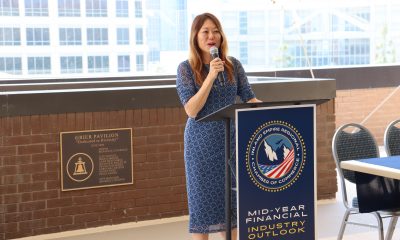Business
Beacon Economics Sets the Record Straight on the UCR Business Center Controversy

Beacon Economics Sets the Record Straight on the UCR Business Center Controversy
By Ken Alan, Forensic Business Journalist
A series of articles reported by the Los Angeles Times in February and April stated some University of California faculty members were “Raising the alarm about a research center affiliated with UC Riverside that they say uses corporate funding for reports ‘attacking proposals to improve the lives of working Californians.’”
The articles cite an “Open letter to the UC Regents seeking investigation of UC Riverside — Beacon Economics relationship,” signed by 56 faculty members at UC Riverside, Berkeley and Davis, along with 44 graduate students. Most signatories appear to be humanities studies faculty with credentials in media studies, music, history and political science. The Times failed to question why faculty with more relevant credentials in business, economics and research appear to have only three signatures.
The story states the letter to UC Regents was circulated by UCR Professor of Media & Cultural Studies Dylan Rodriguez, whose biography can be found here: profiles.ucr.edu/app/home/profile/dylanr.
No questions were raised about how the signatures were gathered at three participating schools and why closer Southern California campuses, such as UCLA or UC Irvine, weren’t included.
None of the articles explain why this petition was sent directly to UC Regents without first going through proper channels at UCR. “If there was some true complaint about the quality of our research, there is a system within UC Riverside to deal with that,” said Dr. Christopher Thornberg, principal at Beacon Economics. “There is an administrative office that handles complaints. And if they really thought that our research was substandard, they could and should have gone through that particular office. They didn’t. They went on this petition campaign. Most of the conversation is about how our answers are morally incorrect. And that’s a really slippery slope.”
The letter to UC Regents and ensuing negative press resulted in the UCR School of Business and Beacon Economics severing their partnership after seven years. “Obviously, the relationship between UC Riverside and Beacon was mutually beneficial. The school got a lot out of it,” said Thornberg. “UC Riverside is a fantastic institution. It is a reflection of what UC was built to be. Technically speaking, the center belongs to the school. It would be hard for me to see them continuing it. One of the biggest problems with these kind of centers is you have to have a motivated leader.”
Most of the controversy seems to stem from an August 2022 Beacon-UCR Research Report entitled “How Increases in Worker Compensation Could Affect Limited-Service Restaurant Prices.” In their letter to UCR Regents, the petitioners stated, “Beacon asserts that legislation allowing fast-food workers a say in setting their pay would mean fast-food price hikes of up to 20 percent or more. Fast-food companies are spending tens of millions of dollars to promote the findings of this report — which they funded. They are trying to convince voters that empowering fast-food workers — most of them women and most of them Latino, Black, or Asian — means a 20 percent ‘food tax.’”
“I’ve always been comfortable working with both sides as long as they’re comfortable with the fact that I’m going to give them the best answer I can on the basis of theory and data, not on the basis of some opinion of what’s morally correct,” said Thornberg. “For a very long time, we have dodged the culture wars. Not this time.”
The report clearly discloses that “This research was supported by the International Franchise Association.” Beacon Economics has prepared studies for both corporations and unions in the past. “We’re never going to sell answers. We’re never going to cozy up to one side or the other. Anybody who engages us in a contract will have to accept the results we come up with. It’s as simple as that. That is a rule we have gone by. I’ve had the opportunity of working, yes, with unions and with business organizations, with chambers and the United Way.”
Most of the conclusions presented in the report can be deduced by common sense, such as this summary statement: “If worker wages in the limited-service restaurant industry are raised, there is little doubt that workers who keep their jobs will be better off. But the change is not costless. Any increase in worker compensation will bring about an increase in prices for consumers, which could hurt lower income households who are already struggling with current inflation in food prices. It will also cause the industry to shrink, with fewer establishments and jobs.”
The report goes on to conclude, “Compensation increases in the 20% to 60% range will cause prices … to increase between 7% and 22%.” The petitioners argue other studies show “about a half percentage point menu price increase for every 10 percent rise in the minimum wage.” Whatever the real number, minimum wage hikes usually mean higher menu prices and fewer employee hours, according to Harri, a workplace management software company that works with more than 4,000 restaurants. Anyone who has visited a big box department store or fast food restaurant recently knows that self-serve kiosks are already displacing human workers to reduce labor costs.
“This entire episode truly saddens us. In a university environment, academic freedom and debate should be a cherished and protected norm, as should well-conducted empirical research, even if the conclusions of that research conflict with certain ideologies,” wrote Thornberg in an email to clients and business associates. “The ending of this partnership and the excellent work CEFD has done over the past decade for the community is not a win for the University, Beacon Economics or the Inland Empire region as a whole.”
The LA Times story also failed to fact check the letter’s claim that “Thornberg’s name doesn’t appear in school faculty or other directories.” Christopher Thornberg’s listing can be readily found in the UCR Profiles directory under “Affiliate – Research Associate” at profiles.ucr.edu/app/home/search;name=thornberg;org=;title=;phone=;affiliation=Affiliate
“When [UCR] first invited me to do the center, they asked me to come on campus and be a full-time faculty member and run the center. I was what they call an ‘unpaid faculty member.’ So I was basically nominated and approved by the business school to get a faculty position as an adjunct professor. But I wasn’t paid,” said Thornberg.
Beacon Economics will continue to operate in the Inland Empire without the affiliation of UC Riverside. “We’ll probably look for another partner at some point,” said Thornberg. “I’ve got nothing but support from our clients. All of our work that was being run through the university has been converted over to Beacon work. The only thing that’s really changing in terms of our efforts in the Inland Empire is the logo on the top of the page.”
Dr. Christopher Thornberg will be presenting on May 19th for the San Bernardino Council of Governments in Lake Arrowhead.
Business
Local Veteran and His Family Open New Graze Craze Charcuterie Business in Murrieta, California

Southern California wine country gets another stylish culinary option, offering beautifully designed, hand-crafted grazing boards and picnic boxes
Graze Craze® has opened a new location close to the wine country of Southern California, where its artfully arranged sweet and savory grazing boards and boxes create a perfect pairing for food lovers. Located at 24530 Village Walk Place, Suite C, in Village Walk Plaza, the 1,021-square-foot store is owned and operated by disabled veteran Chris Stout and his wife, Stephanie Stout, with assistance from their teenage children.
At Graze Craze, highly trained experts known as Grazologists™ skillfully design charcuterie arrangements that feature an assortment of fine ingredients perfect for grazing, like fresh fruits and vegetables, premium meats and cheeses, artisanal sweets, nuts, house-made jams and more.
Chris Stout enlisted in the U.S. Navy in 2001 and served several deployments before being discharged in 2012. Since then, he has worked as a field service engineer for an electronics company and in manufacturing sales. Stephanie Stout has a bachelor’s degree in business accounting from the University of Phoenix and worked for an insurance broker before the couple’s first child was born; she then devoted herself full-time to raising their three children, who are now in high school.
Graze Craze charcuterie boards offer something for every lifestyle, dietary preference or palate and are available in a variety of size options to cater to any occasion, big or small. They incorporate a medley of flavors, like the fan-favorite Gone Grazey board, a perfectly balanced mix of cured meats, premium cheeses, crackers, fresh produce, nuts and more. The Vegegrazian is impeccably designed with a plethora of fresh fruits and vegetables for anyone embracing a plant-based lifestyle. Those with an undeniable sweet tooth can enjoy the Sweet & Grazey, a hand-crafted board featuring an abundance of delectable desserts like chocolates and baked goods paired with sweet dips to accent the irresistible flavors.
New to the Graze Craze menu is the Brunch Board, a gourmet and innovative twist on any morning routine. Packed with breakfast meats, fresh fruits, eggs, pastries and more, this board is the perfect bagel-and-donut brunch alternative. Grazers can also tackle watch-party cravings with a seasonal Game Day Board, featuring a feast of
crowd-pleasing ingredients, like peppered salami, Italian prosciutto, goat cheese, cranberry walnut bread, raspberry jam and chocolate bark, to name a few.
The artisan-inspired charcuterie offerings at Graze Craze are available in different size options, from Char-Cutie-Cups and Picnic Boxes for nibbling to sharing-size boards with enough fresh food to feed a large party. The food displays are ideal for elevating work meetings, family gatherings, lavish events and more, while they also make for memorable gifts that impress.
Besides sharing the flavorful menu with the area, the Stouts are actively involved in numerous local school, business and community organizations. The pair supports the Murrieta Valley High School Marching Band Boosters and California High School Rodeo Association District 8, in addition to the Boy Scouts of America California Inland Empire Council and Friends of Temecula Troop 309, where Christopher Stout is a part of the adult leadership team. The couple has also worked with Homes For Our Troops, an impactful nonprofit organization that builds specially adapted homes for post-9/11 disabled veterans.
Graze Craze Murrieta is open for pick-up, catering and free local delivery Monday through Saturday from 9 a.m. to 6 p.m. and Sunday from 10 a.m. to 2 p.m. For more information, call 951-942-7293.
Business
Partners in Action: How CalOSBA is bridging the gap in funding and resources for Inland Empire small businesses

By Josaline Cuesta, California Program Director, Small Business Majority & IEBJ Content Contributor
For Tara Lynn Gray, Director of the California Office of the Small Business Advocate (CalOSBA), entrepreneurship has always been a core principle of her life. Her journey as an advocate for small businesses wasn’t built on textbooks, but on her family’s roots in small business ownership. As a young girl, she watched her grandmother empower and elevate Black women’s presences by styling their hair and instilling confidence in their personhood. She witnessed the direct impact of small businesses on community members in real time, and that’s always stayed with Tara.
As a key partner of Small Business Majority, she stands as a champion for the dreamers and risk-takers; the pillars of the communities across California and in the Inland Empire. I chatted with her to share more about her work at CalOSBA, what entrepreneurs can expect when they meet with a CalOSBA advisor, and the resources and community support available to help boost entrepreneurship in the Golden State.
Tell us about CalOSBA’s role in the small business community.
“California has the biggest small business community in the country, accounting for 4.1 million small businesses in 2023 alone. The overwhelming majority have no employees at all, except themselves, which means they don’t have a Board of Directors, expensive consultants, and they definitely don’t have lobbyists. I take my role as their advocate seriously, talking with and listening to small business owners from up and down the state. During the pandemic, we were under a very bright spotlight, administering nearly $5 billion in direct relief funding and we’re proud of the grant programs we still oversee. But that’s only a small part of what we do at CalOSBA.
My team connects small business owners to information and resources to help them get started, manage their business and, most importantly, to grow. If they’re looking for help, we want to be the first door they knock on. In addition, we offer Outsmart Disaster training, which focuses on how to mitigate risks associated with natural disasters and recovery avenues available to them. I always say the flagship of our office is our support for the statewide network of Small Business Centers, providing 1:1 business assistance and training for small business owners of all industries and in dozens of languages. In addition, supporting partners that deliver these services–all the federally funded centers like the Small Business Development Centers and the Women’s Business Centers but also Chambers of Commerce and other nonprofits—is a core function of my office. And a big source of pride because we know what a difference they make for their clients.”
What can small business owners expect from meeting with a California Small Business Center advisor?
“Small business owners can expect to meet someone who is fully invested in them. Our Centers cover the full spectrum of business needs, from writing a business plan and obtaining the right permits and licenses, to finding capital, planning a succession strategy and marketing to e-commerce. Our business advisors provide the experience and the objective perspective to help business owners optimize their best assets: ideas, energy, and ability to keep adapting and learning. And they do it because they love helping other people succeed. What’s more, business ownership can become isolating and it may be challenging for entrepreneurs to find assistance. But they don’t have to go at it alone–and they shouldn’t, when these no-cost and low-cost services are available to them.”
What’s the most rewarding part of your role at CalOSBA?
“I always say I have the best job in the state. And it’s because I frequently have the honor to watch someone’s dream come true. I love a ribbon-cutting ceremony–Every time, big or small. It means someone dreamed of accomplishing something and worked hard for it: They opened the doors to their business, they made a sale, and hopefully they will hire their first employee and then it’s off to the races. But no matter what happens to that business, that ribbon-cutting is a milestone they made happen for themselves. There are many other events I get invited to, where you can just see the hope and pride, and even fear in their faces. I’m often overwhelmed by the sheer emotion of it, and I’m always humbled that I get to participate in that person’s big milestone.”
What are some new programs that can benefit small business owners in the Inland Empire?
“The number one question my office gets asked is how to access small business financing. To help address this key need, we’re launching the Technical Assistance for Capital Readiness program this February. The program is part of a bigger effort to fill well-known funding gaps in the state to benefit very small businesses and Socially and Economically Disadvantaged Individuals (SEDI). Through investments from the U.S. Treasury, the State Treasurer’s Office and IBank, the program is going to support lenders to facilitate “high risk” loans that they normally would not approve.
In addition to supporting lenders, my office also received $25.3 million in U.S. Treasury funding to start the new Capital Readiness network. The Capital Readiness Coaches in this network will help business owners get ready for the lending marketplace, help them make the best choices in a high interest-rate environment, and optimize the use of the capital once they receive it. The network is also designed to help spread the word about this opportunity to these SEDI-owned businesses, and some of those partners will be focused on supporting the Inland Empire small business ecosystem.”
How can business owners get in touch with CalOSBA?
“That’s simple! Check out calosba.ca.gov and sign up for our monthly newsletter, where I write a column and showcase success stories from our network, along with deadlines and updates on grant and workforce support programs. We’re also on social media, so I would encourage business owners to check out all of our channels.”
Business
2024 Banking & Financial Industry Outlook: Where Knowledge Meets Opportunity in California’s Financial Landscape

In an age where financial trends rapidly evolve and economic landscapes shift with increasing unpredictability, the Inland Empire Regional Chamber of Commerce stands as a beacon of knowledge and opportunity. It proudly announces its sold-out annual event, the Financial Industry Update, an exclusive gathering tailor-made for California and the Inland Empire region. This prestigious event is set to unfold on January 18, 2024, at the Ontario International Airport Authority Conference Center, promising an enriching experience for attendees.
A Gathering of Minds in the Financial Sphere
The Financial Industry Update is more than just an event; it’s a crucial nexus for professionals, businesses, and community leaders keen on gaining a deeper understanding of the financial nuances specific to California and the Inland Empire. This year’s event is particularly significant, given the rapid changes and challenges facing the financial sector in the region.
Keynote Speaker: A Treasury of Knowledge
Leading the charge is none other than California State Treasurer Fiona Ma, a figure renowned for her acumen in public finance, economic development, and responsible fiscal management. Her role as the keynote speaker underscores the event’s stature, offering invaluable insights into the financial future of California and the Inland Empire.
Featured Speakers: A Diverse Spectrum of Expertise
Joining Treasurer Ma is a lineup of distinguished speakers, each bringing unique perspectives and expertise:
- Ivo Tjan: As the Chairman, President, and CEO of CommerceWest Bank, Tjan’s journey from founding the company to leading it through an IPO is nothing short of inspirational. His leadership and insights are eagerly anticipated.
- Hilda Kennedy: The Founder/President of AmPac CDC and a trailblazer in local government and economic development, Kennedy’s impact on small businesses and community financing is profound.
- Edward Ornelas, Jr.: The visionary force behind the Inland Empire Regional Chamber of Commerce, Ornelas’s innovative approaches to business and economic development have redefined the region’s business narrative.
Event Highlights: More Than Just Talks
The event promises more than just insightful presentations. It’s a unique opportunity for networking, where professionals can connect, collaborate, and engage with potential partners and influential community figures. The interactive Q&A sessions will allow attendees to delve deeper into subjects, clarifying doubts and gaining more profound knowledge.
A Confluence of Opportunity and Expertise
This event symbolizes the intersection of knowledge and opportunity in California’s dynamic financial landscape. It’s a platform where insights are shared, connections are made, and the future of the financial industry in the Inland Empire is contemplated and shaped.
As January 18 approaches, the anticipation among California’s financial community continues to build. This event is not just a meeting of minds; it’s a forge where the future of financial industry trends and strategies will be hammered out, shaping the economic future of the Inland Empire and beyond.
For more information about the event and the Inland Empire Regional Chamber of Commerce, visit www.iechamber.org
-

 Opinion1 month ago
Opinion1 month agoSurge in Unemployment Among California Youth Linked to Minimum Wage Hikes
-

 Commercial Real Estate Transactions3 weeks ago
Commercial Real Estate Transactions3 weeks agoSRS Real Estate Partners Announces Record-Breaking $6.15 Million Ground Lease Sale of a New Construction Chick-fil-A Property in Murrieta, California
-

 Health & Wellness3 weeks ago
Health & Wellness3 weeks agoBuddha Bars: A Mother’s Innovative Solution to Healthy Snacking
-
By Press Release1 week ago
California Employment Expansion Continues But Still Trails Nation








